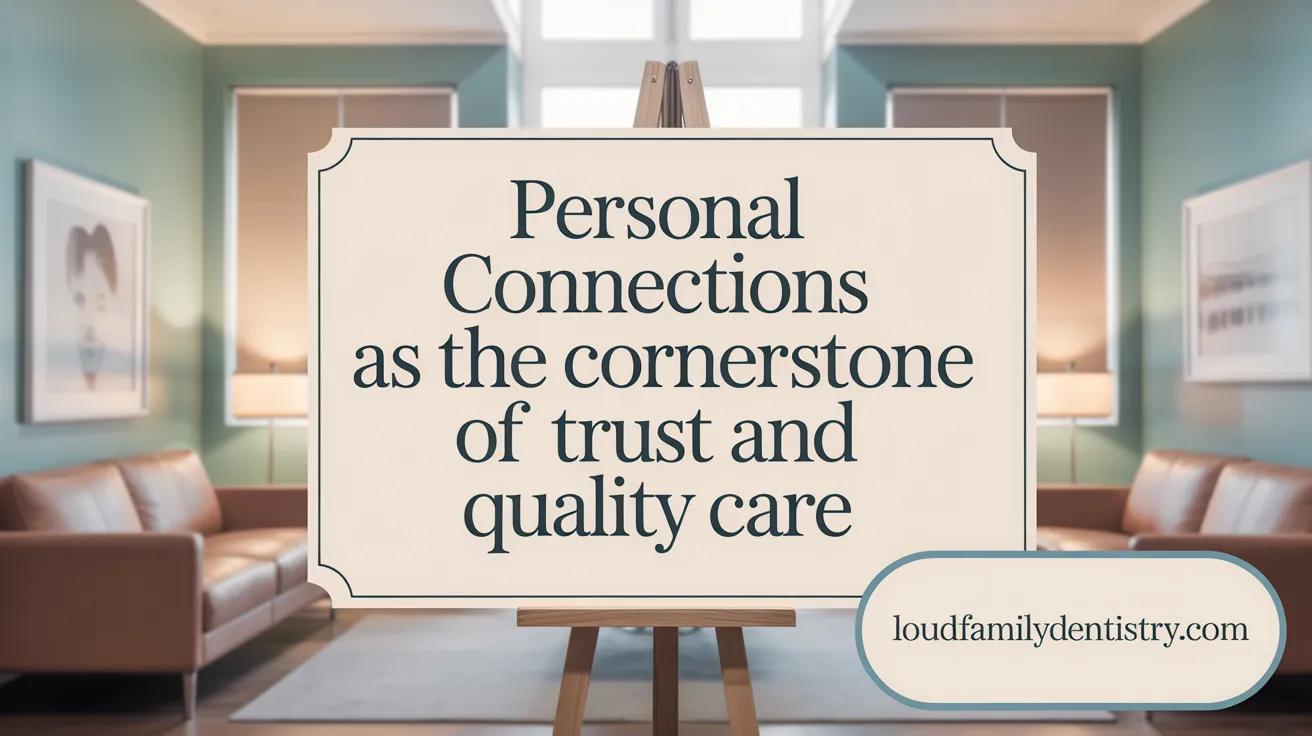Understanding the Power of Personal Connections in Dentistry
In today's rapidly evolving dental landscape, the integration of technology, including AI, offers unprecedented efficiency and diagnostic precision. Yet, amidst these advancements, the irreplaceable value of personal connections within dental teams remains paramount. It is through genuine human interaction that trust is forged, communication flourishes, and patient care reaches its highest potential. This article delves into why personal relationships in dental settings matter deeply—not only for patient outcomes but also for team dynamics, workplace culture, and professional growth.
The Essential Role of Personal Connections in Trust, Communication, and Patient Care

Why are personal connections with the dental team important for trust, communication, and patient care?
Personal connections with the dental team are foundational for effective healthcare delivery. When patients feel genuinely valued and understood by their dental professionals, it fosters a sense of trust that is crucial for open dialogue.
These relationships encourage patients to express their concerns, ask questions, and actively participate in treatment decisions. Such active engagement leads to more tailored care, addressing individual needs, preferences, and circumstances.
Building trust through empathy and active listening can also significantly reduce patient anxiety. When patients are comfortable, they are more likely to adhere to recommended treatments and return for follow-up visits.
Moreover, strong personal bonds create a positive environment where patients view their dental team as partners in maintaining their health. This partnership not only enhances patient satisfaction but also promotes better oral health outcomes over the long term.
Ultimately, authentic personal connections form the backbone of patient-centered care, ensuring that treatment is delivered with respect, understanding, and compassion.
Fostering Strong Relationships to Enhance Team Dynamics and Morale

How does relationship-building within dental practices enhance team dynamics and morale?
Establishing solid relationships within a dental practice is fundamental to creating a positive and productive work environment. When team members develop trust, open lines of communication, and mutual respect, collaboration becomes more natural and effective. Staff members who feel appreciated and supported are more inclined to share ideas, offer feedback, and assist one another, leading to smoother workflows and better patient outcomes.
Recognition and appreciation play vital roles in strengthening these bonds. Celebrating individual efforts and acknowledging contributions boost motivation and foster a sense of belonging. This recognition can be simple, such as verbal praise during team meetings or more formal, like employee awards.
In addition, professional development opportunities are closely linked to job satisfaction. When staff are encouraged to enhance their skills through continuing education or certifications, it demonstrates investment in their growth. This not only improves their competence but also increases engagement and loyalty.
Creating an inclusive workplace culture is essential. Leaders must promote respect, fairness, and openness, ensuring that all team members feel valued regardless of their role or background. Such an environment reduces conflicts and builds a cohesive team that aligns with shared goals.
Ultimately, relationship-building efforts culminate in a workplace where staff are motivated, morale is high, and patient care is significantly improved. A harmonious team that communicates well and supports one another is better equipped to handle challenges, leading to sustained success for the practice.
Why Genuine Human Interaction Surpasses AI in Dental Care
What are the benefits of genuine human interaction over AI or automated communication in dentistry?
In dental care, the connection between the patient and the dental team is fundamental to building trust and ensuring successful treatment outcomes. Human interactions offer emotional support, reassurance, and personalized attention—things that automated systems and AI simply cannot replicate.
When patients engage directly with caring dental professionals, they are more likely to feel understood and valued. This personal communication helps patients gain clarity about their treatment options, easing anxiety and fostering cooperation. For example, when a dentist discusses a treatment plan empathetically, patients are more confident and comfortable with proceeding.
While AI greatly assists in increasing diagnostic accuracy, streamlining administrative tasks, and identifying potential health issues through data analysis, it lacks the ability to provide comfort or read subtle emotional cues. AI can suggest optimal treatment options based on data, but it cannot interpret a patient’s non-verbal signals—such as hesitation or nervousness—that are vital for tailored patient care.
The human touch enables practitioners to pick up on these cues and adjust their approach accordingly, creating a more patient-centered experience. Overall, integrating advanced technology with genuine human interaction ensures that care remains compassionate, effective, and personalized, ultimately leading to higher patient satisfaction and trust.
Personal Relationships as Pillars of Well-Being and Positive Workplace Culture

How do personal relationships contribute to overall well-being and workplace culture in dental settings?
In dental practices, personal relationships among staff members are fundamental to creating a positive and productive work environment. When team members foster supportive and respectful interactions, it boosts morale, increases job satisfaction, and encourages a collaborative atmosphere.
Strong connections help reduce interpersonal conflicts, making daily operations smoother and more enjoyable. For example, respectful communication between dentists, hygienists, and administrative staff enhances teamwork, which directly benefits patient care. When staff feel valued and understood, they are more engaged and motivated.
Recognizing efforts through rewards, praise, and team-building activities further nurtures these relationships. These efforts lead to higher staff retention and a more cohesive, inclusive workplace culture.
Moreover, a culture built on trust and open communication improves overall efficiency. It encourages staff to share ideas and address concerns without fear, facilitating continuous improvement and innovation.
Ultimately, nurturing personal relationships in a dental setting results in a healthier workplace environment. This positivity translates into better patient experiences, improved treatment outcomes, and a resilient, motivated team.
| Aspect | Impact | Example |
|---|---|---|
| Morale | Increases | Appreciation and recognition boost staff spirit |
| Conflict Reduction | Lowers | Respectful dialogue prevents misunderstandings |
| Team Cohesion | Strengthens | Team activities foster trust |
| Patient Care | Improves | Happy staff provide better patient interactions |
| Staff Retention | Enhances | Valued employees stay longer |
Fostering these personal ties creates a cycle of positivity that benefits everyone — staff, patients, and the practice as a whole.
Strategies to Cultivate Authentic Connections and Enhance Communication

What strategies can dental professionals use to foster authentic connections and effective communication among themselves and with patients?
Building genuine relationships in dental practice is crucial for patient satisfaction and team cohesion. One of the most effective approaches is practicing active listening. This involves giving full attention to patients and colleagues, understanding their concerns without interruption, and paraphrasing their words to ensure clarity.
Showing sincere empathy helps patients feel valued and understood. Recognizing their fears, preferences, and individual circumstances creates a trusting environment. Dentists and staff can further enhance communication by using clear, straightforward language, avoiding complex dental jargon. Visual aids and diagrams can also assist in explaining treatment options effectively.
Adopting a patient-centered approach is essential. This means understanding each patient’s unique needs, concerns, and lifestyle, which fosters shared decision-making. Patients who feel involved in their treatment choices are more likely to trust the process and follow through.
Consistency and transparency in communication support long-term relationships. Regular updates via follow-up messages, secured portals, and face-to-face conversations ensure patients feel connected and respected. Non-verbal cues such as body language, facial expressions, and a calm demeanor contribute significantly to creating a welcoming atmosphere.
Supporting these practices is ongoing team training focused on communication skills. When all members of the dental team are aligned in their approach, interactions are more cohesive, respectful, and effective. In sum, combining active listening, empathy, clarity, personalization, and continuous learning paves the way for strong connections both with patients and within the team.
The Critical Impact of Personal Relationships on Staff Retention and Career Growth

How do personal relationships impact staff retention, job satisfaction, and career development in dentistry?
In the fast-paced and demanding world of dentistry, strong personal relationships within the dental team significantly influence overall staff retention and job satisfaction. When team members feel valued, respected, and connected, they are more likely to stay committed to their workplace.
Authentic appreciation and positive interactions among colleagues and leaders foster a supportive environment. Recognizing individual efforts and promoting open dialogue boost morale and reduce workplace stress. These nurturing relationships help staff feel seen and heard, which enhances their confidence and satisfaction.
Furthermore, meaningful connections open opportunities for mentorship, skill development, and collaborative growth. When staff members can share knowledge and experiences in a trusting setting, they tend to grow professionally and are more engaged in their careers.
During challenging times like the COVID-19 pandemic, these interpersonal bonds become even more crucial. Increased stress and uncertainty can lead to higher turnover rates, but a cohesive team with strong relationships helps mitigate these effects.
Ultimately, prioritizing genuine relationships and fostering a positive work culture are essential strategies to retain staff and support their long-term career advancement in dentistry.
Networking and Relationship Management: Foundations for Industry Success
Why is networking and relationship management significant within the dental industry?
Building strong professional relationships and engaging in networking are vital aspects of a successful dental practice. These connections open doors to valuable referrals and collaboration opportunities that enhance patient care.
Networking allows dental professionals to create a trusted circle of colleagues, including general dentists, specialists, and other healthcare providers. This interconnectedness streamlines treatment planning and referral processes, especially for complex cases like sleep medicine or oral appliance therapy.
Participating in community activities, attending industry conferences, and actively engaging in online groups enable dentists to stay current with the latest trends, techniques, and innovations. Such involvement enhances their knowledge base and helps in adopting best practices.
Moreover, strong relationships foster trust and open communication, which are crucial for maintaining high standards in patient care and practice growth. When colleagues and referral sources perceive a practitioner as reliable and collaborative, it encourages long-term partnerships.
In the competitive environment of dentistry, especially with the emergence of corporate practices, a well-developed network can differentiate a practice and support its ongoing success. Overall, cultivating genuine professional relationships is essential for improving treatment outcomes, building reputation, and ensuring sustainability.
Benefits of professional networking and collaboration
| Benefit | Description | Impact on Practice |
|---|---|---|
| Increased referrals | Strong relationships lead to more patient referrals | More patient inflow boosts revenue |
| Knowledge sharing | Staying updated through peer learning | Adoption of new techniques |
| Collaboration opportunities | Working with specialists or healthcare teams | Comprehensive patient care |
| Industry insight | Learning trends and regulations | Staying compliant and competitive |
| Personal growth | Mentor-mentee relationships | Enhanced leadership skills |
Role of referrals and interdisciplinary cooperation
Referrals are the backbone of a thriving dental practice, facilitating access to specialized treatments and comprehensive care. Interdisciplinary cooperation ensures that patients receive well-rounded solutions, which enhances trust and satisfaction.
Keeping updated through conferences and professional groups
Regular participation in conferences and joining professional groups like the ADA or local dental societies helps with continued education and industry awareness. These platforms foster networking, idea exchange, and professional mentorship.
Support systems for private practice owners and dentists
Organizations like the Academy for Private Dental Practice (APDP) provide essential support, offering community, resources, and leadership development. Attending such gatherings and engaging in mentorship opportunities promote resilience and growth.
Developing personal and professional connections in dentistry is not just about expanding a network; it’s a strategic approach to improve patient outcomes, grow your practice, and stay inspired in a challenging industry.
The Irreplaceable Value of Human Connection in Dentistry
While technological innovations like AI continue to transform dental practices, the foundational element of exceptional care remains the human connection between dental teams and patients. Trust, empathy, and genuine relationships foster not only better patient outcomes but also a thriving, supportive workplace culture that benefits staff retention and professional development. Investing time and effort into building authentic connections, effective communication, and collaborative team environments ensures that dental practices can navigate industry challenges and achieve long-term success. Ultimately, it is the heart and humanity in dentistry that technology can enhance—but never replace.
References
- Why your dental team matters: 3 things AI can't do for ...
- S1 E5: The power of connection
- Building Strong Relationships with Your Dental Team
- Positive communication in the dental practice reduces risk ...
- The Importance of Connection in Dentistry
- Developing connections among employees: A key to ...
- Communicating with colleagues
